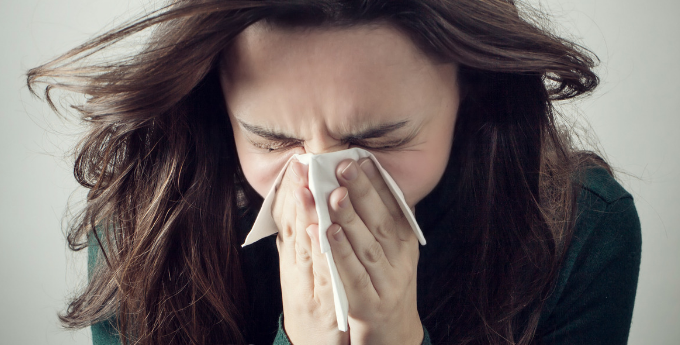Dr. Guggiari explains that allergy is a very common immune disease that occurs after sensitization (formation of IgE antibodies or delayed response by lymphocytes) to a certain substance, which can be aeroallergens (dust mites, animal epithelium , pollens, fungi, etc) as well as food, medicines, insect poisons, etc. He expressed that “today they are considered a true silent epidemic and it is estimated that by 2050 half of the world’s population will suffer from some type of allergic disease.”
Allergies Vs Cold, how to differentiate?
One of the most frequent manifestations of respiratory allergy is allergic rhinitis. It is characterized by pictures of persistent nasal congestion, associated with itching of the nose, throat or even the eye, with frequent crises of sneezing. These same symptoms are present in a viral cold infection, which is why the patient frequently confuses it with an allergy or vice versa. However, there are some differences between one condition and another, such as fever, typical of viral conditions and absent in rhinitis. The viral picture appears abruptly from one day to the next, however, in perennial allergic rhinitis the patient suffers from symptoms most of the time, these appear first thing in the day and improve spontaneously in the course of the morning . Of course, early and adequate medical consultation is the one that will finally be able to clarify the picture based on the clinical history, the adequate physical examination and the performance of relevant studies.
types of allergies
Guggiari affirms that the most frequent allergic conditions in our environment today are allergic rhinitis and allergic bronchial asthma, especially in school children and adolescents, associated with their different complications. In young children, between 1-2 years of age, food allergies (proteins from cow’s milk, egg, wheat, corn, soy, shrimp) have increased considerably. However, for some time now, the number of patients, mainly adults, due to allergic reaction to different medications, some of them even due to anaphylaxis (severe allergic reaction), has also increased considerably. Atopic dermatitis and contact eczema are also a frequent cause of consultation. “More rarely we see patients with rare allergic pathologies such as hereditary angioedema, mastocytosis, or eosinophilic esophagitis, among others,” he said.
Current diagnostic methods
The evaluation of allergic patients begins with a detailed clinical history, followed by a thorough physical examination and finally allergy tests, in order to confirm what is suspected by the patient’s history.
There are currently several allergy tests, they consist of subjecting the patient to a challenge or provocation with the substance that is suspected of being responsible for their symptoms. The tests can be performed on the patient’s skin by puncture (prick test, intradermal) or by contact (patch test) as well as controlled oral provocation for food or medication. To do this, you must have a nursing specialized in carrying out such procedures, which are not without risks, and you must have all the security measures and adequate training, for the adequate intervention in case of serious reactions, he explained. Dr. Jaime Guggiari (h).
For special and more complicated cases, at La Clínica Guggiari, they have laboratory tests (molecular immunology by FABER Test, Tryptase Dosage, degranulation markers by flow cytometry, among others) where it is essential to have adequate training for interpretation correct of them.
Types of treatments
The main treatment in allergy is the avoidance of the substance (allergen) responsible for generating the symptoms (allergy) in the patient. However, when avoidance is unlikely (stationary dust mites), or there is an allergy to an important food in the diet (milk, egg) or when the patient is allergic to a certain drug and there is no substitute for it, desensitization of the patient to the allergen in question. Guggiari explains that desensitization or immunotherapy can be done in several ways; At present, there are protocols for oral, sublingual, subcutaneous, intraganglionic, or intravenous application to carry them out.
The choice of one method or another depends on several factors that have to be discussed between the professional and the patient, in order to achieve good adherence to treatment.
Severe reactions and urgency in allergy
The main emergency in allergology is anaphylaxis, which consists of severe reactions involving acute symptoms of hives, swelling of the lips or tongue, shortness of breath, fainting with loss of consciousness, hypotension and even cardiorespiratory arrest. In these cases, immediate application of intramuscular epinephrine and immediate cardiorespiratory assistance should not be hesitated, as well as transfer to an emergency medical unit as soon as possible, Dr. Guggiari assured.
Recommendations for allergic patients
It is very important to consult in time to obtain an early diagnosis, adequate medical intervention and prevention of complications. Dr. Jaime Guggiari (h) expresses that in cases of allergic patients who have already identified the reason for their allergy, adherence (compliance) with the indicated treatment is essential. In the cases of patients with a history of anaphylaxis, there should be an action plan and training for the rapid application of adrenaline. In cases of drug allergy, it is recommended that the patient has an identifier (necklaces, bracelets or official document signed by the allergist) that details the specific name of said drug.
Allergic diseases have been a public health problem for several decades due to their high prevalence, their complications and the impact on the quality of life of these patients. Proper diagnosis and treatment prevents the appearance of complications, for example, that allergic rhinitis does not evolve into asthma (adequate prevention of allergic asthma), anaphylaxis, etc.
The treatment of many allergic patients constitutes real clinical and sometimes surgical challenges, compromising teamwork with all related specialties, pointed out Guggiari, an allergist and clinical immunologist.

















